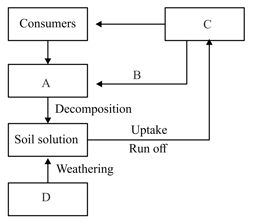Nutrient Cycling
Nutrient Cycling: Overview
This topic covers concepts, such as Biogeochemical Cycles, Standing State, Gaseous Nutrient Cycles, Carbon Cycle, Sedimentary Nutrient Cycles, and Phosphorus Cycle.
Important Questions on Nutrient Cycling
The main role of bacteria in the carbon cycle involves –
In the given diagram, some labels are missing. Identify them and select the correct option:

Correct statements among the following are:
I. Atmospheric input of phosphorous through rainfall is much smaller than carbon.
II. Gaseous exchange of phosphorous between organism and environment is negligible.
III. Herbivores and other animals obtain phosphorous through their foods.
IV. A considerable amount of carbon returns into the atmosphere through the burning of fossil fuels.
What amount of carbon is fixed in the biosphere through photosynthesis annually?
Which of the following statements is/are correct?
(a) The entire sequence of communities that successively change in a given area is called sere
(b) The natural reservoir of phosphorus is rock.
(c) Ecological pyramids do not accommodate food web.
The phosphates remain outside the natural cycle for a long time
Consider the following statements about carbon cycle and choose how many statements are correct?
(a) Atmosphere has of total global carbon.
(b) Decomposers contribute substantially to pool by their processing of waste materials and dead organic matter of land or oceans.
(c) carbon is fixed through photosynthesis annually.
(d) No respiratory input into atmosphere.
(e) Carbon constitutes of dry wt. of organisms.
Carbon constitutes _____ of dry weight of organism and _____ percentage is dissolved in oceans out of total global carbon.
Major utilisation of carbon from the atmosphere is through:
The word ‘standing state’ in ecosystem refer to
Which one of the following pairs is a sedimentary type of biogeochemical cycle
Concentration of nitrogen remains constant by
